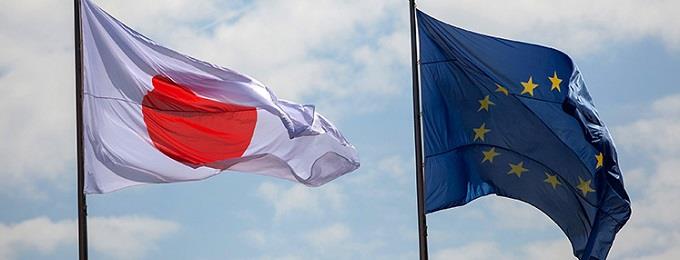EU Commissioner Carlos Moedas discussed a deepening of cooperation in Horizon Europe, moonshot projects and AI with Japan’s Science Minister Takuya Hirai.
During the Japan-European Union (EU) Summit on 25 April 2019 the Japanese Prime Minister Shinzo Abe, President of the European Council Donald Tusk and President of the European Commission Jean-Claude Junker reconfirmed their commitment to their partnership in research and innovation. In their ‘joint statement’ they promise extended co-funding of projects and welcome the new arrangement to provide opportunities for collaboration between research from the European Research Council (ERC) and the Japan Science and Technology Agency (JST).
The summit created momentum for a subsequent meeting between the EU Commissioner for Research, Carlos Moedas and Japan’s Science Minister Takuya Hirai on 7 May to explore the deepening of research ties. The meeting in Brussels confirmed Japan’s political commitment to Science, Technology and Innovation (STI) cooperation with Europe and signalled interest in the new research and innovation framework programme Horizon Europe. The countries ambitions in STI cooperation with Europe were already mentioned in summits with France and Germany respectively and are mirrored in increasing ties with researchers and companies particularly in the area of Artificial Intelligence (AI).
Horizon Europe will be more open to cooperation with third countries than its predecessor programmes. It offers new entry terms for association and contributions to the budget for countries fulfilling certain criteria such as strong STI performance, political stability and the respect for human rights. Japan is at the top of the list of countries matching these conditions and thus a favourite candidate for the EU. However, despite the obvious interest, Japanese officials want to understand all details of the deal before making any commitments. While association will give greater access and a fairer balance in payments than participation under single agreements as currently done with the JST, it may also entail specific conditions for participation in the individual parts of Horizon Europe.
In turn, Japan is driving its own great science endeavour the ‘Moonshot Programme’ funded with 100 billion Yen (the equivalent of €807 million) for five years. This programme is similar to the missions approach within Horizon Europe and targets solutions to ambitious social and economic challenges. Japan is confident that the moonshot programme will offer opportunities for cooperation with the EU and invites EU contributions. The German and Japanese research ministers have already discussed a potential involvement of Germany in the moonshots alongside automated driving, AI and the internet of things in a meeting in Tokyo in April.
STI cooperation between Europe and Japan already goes back a long way, with a science and technology agreement signed in 2009, regular joint committee meetings and a strategic partnership signed in 2015. The partners focus their cooperation mainly on ICT, aeronautics and advanced materials but also want to push areas such as health, arctic research and automated driving further. In addition, EU-Japan cooperation within Horizon 2020 is the closest with a third country amounting to 134 successful Japanese applicants in 107 funded projects. They also jointly engage in a G7 working group on open science and share their views on human-centric principles for AI. Last December, Japan’s largest research institute RIKEN opened their European office in Brussels creating also some geographical closeness.

